The following post features portions of an interview with Chris and Beth Vecera of Naysayer Coffee Roasters. Some quotes have been lightly edited for clarity and flow.
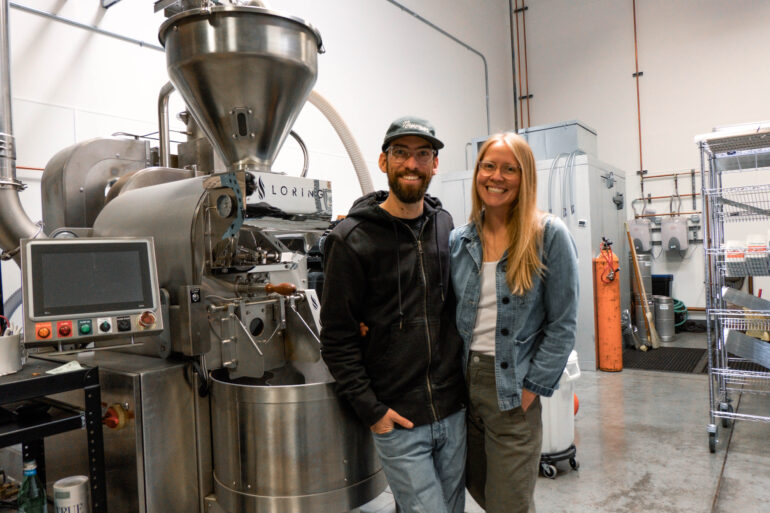
How to Start a Coffee Roasting Business
One day while driving home from their respective jobs in Orange County, California, Chris and Beth Vecera wondered to themselves whether they could start a coffee roasting business of their own.
“Hey, do you think we can do this?” Chris asked.
Beth responded, “Sure. Let’s do it.” And that, as they say, was that.
The year was 2017 and they had a long road ahead of them, but they were determined to make it work. Failure wasn’t an option. They’d long dreamed of starting their own coffee roasting and wholesale business and they were ready to take the first step. By summer, they were packing up their young family and heading back to Chris’ hometown of Napa, California. It would become their home base of operations.
Now came the big question: how do you start a coffee roasting company, exactly?
A History in Coffee Culture
Like many professionals, they started on the bottom rung of the ladder.
Beth and Chris met in college, as people often do. Both were attending school in Orange County and working in local coffee shops as baristas. It’s not an uncommon story – young people working behind the counter and falling in love with the coffee industry from the very beginning.
They hopped from town to town before settling in the city of Orange, where Beth worked as an administrative assistant and Chris taught high school while following his coffee passion with a gig at Bodhi Leaf Coffee Traders as part of their roasting and production team. He relished the process of selecting the green coffees the company would sell to other roasters or roast themselves. Being a bridge between exporters, importers, and coffee roasters was his wheelhouse and became what he loved most about the industry.
Between their barista careers and time spent on the production side, the couple amassed a decade of experience in the coffee industry by the time they took the leap to create their own company.
When they dreamily threw around the idea of starting their own coffee roasting business, wholesale seemed like the most sensible option. It gave them the opportunity to continue being that bridge, fostering partnerships between coffee origin countries and local shops in their neighborhood. A sense of community would be a vital part of their business – a core value they decided early on to embrace.
Their background in the coffee industry proved to be fundamental in building their own roasting business after making the big move back to Napa. Beth excelled at project management and marketing while Chris used his experience in sourcing and roasting green coffee to make sure they were offering a high-quality, ethically sourced product.
“I loved the whole process,” Chris says. “It took about a year to plan the business – to do the hardcore planning of it – before we actually launched. And that’s how we ended up here!”
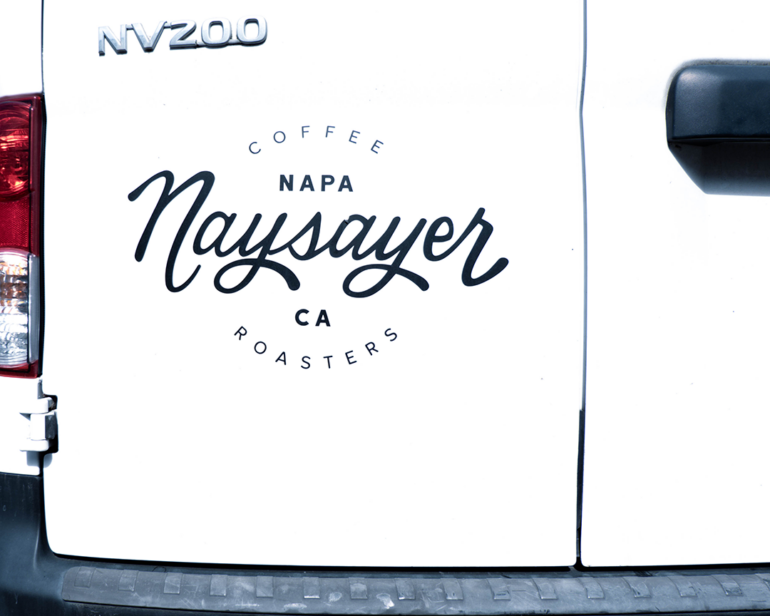
Getting Started in the Coffee Roasting Business: Early Challenges
The First Year
The couple launched Naysayer Coffee Roasters in 2019 after the aforementioned year of planning. They leased out a decent space, acquired a Loring S15 Falcon roaster, sourced their first coffee, and set up shop. According to plan, they started wholesale, roasting at a warehouse just outside of town and rustling up accounts where they could.
“We knew we wanted to start it that way so we could partner with other businesses in town. It fits really well with Napa,” Chris says. “We can elevate their coffee program because it’s what we’re good at and they do what they’re good at in their business, whether it’s a winery or a café or a bakery or a restaurant.”
It wasn’t easy, of course. Brand recognition was the earliest challenge. As a new business with no public-facing branding and an untested product, there was a lot of boots-on-the-ground work to be done. They handed out business cards and coffee samples to any business they thought would be a good fit and hoped for a lucky break. They went through a lot of no’s before they got to that first “yes.”
Thankfully, Napa Valley was a good place to set up shop. It may be a world-renowned tourist destination, but at its core it’s still a town full of locals who care about supporting their own.
“Napa really does like supporting local businesses, so early on we had a couple of reputable businesses that took us under their wing and gave us that early credibility, which really helped,” Chris says. “Contimo Provisions was one of our first accounts. Louis Martini was our first winery. Clif Family Winery, also.”
The business finally found its wings and took its first tentative flight. Things were looking up.
Then 2020 came around.
Coffee and the Covid-19 Pandemic
Nothing grinds a new business (or an established business) to a halt faster than a global pandemic, turns out.
After scarcely a year of Naysayer selling wholesale, Napa went quiet. Tourism declined, businesses shuttered for indeterminate amounts of time, and restaurants weren’t seating customers. Most importantly, the wholesale accounts dried up. When there’s no one to serve coffee to, there’s no reason to buy coffee.
Without those accounts to keep them afloat, Naysayer had to pivot. Selling direct to customers was part of the five-year plan, but with only a year of business under their belt, it had to happen much sooner than expected. They ramped up online sales and delivered bottled coffee door to door in town and shifted their wholesale efforts to grocers and other essential businesses. In the end, it was Napa itself that saved them.
“They have showed up so much for us during the pandemic,” Beth says.
Chris adds, “Even during the pandemic, yeah. Driving around in my van delivering coffee to people’s doorsteps for hours a day.”
“The kids and I did that, too.” Beth nods.
“Divide and conquer, yeah. That’s how we made it,” Chris says. “We didn’t have a coffee shop; all the wholesale accounts were closed. The town was the tipping point where it was like, okay, we’re doing something right.”
As California businesses slowly reopened over the course of the year, an espresso cart seemed like an obvious solution. They offered coffee as a popup at local farmer’s markets and outdoor venues. It was hard work, but they refused to give up on their dream. The shift to retail proved to be exactly what their roasting business needed to survive.
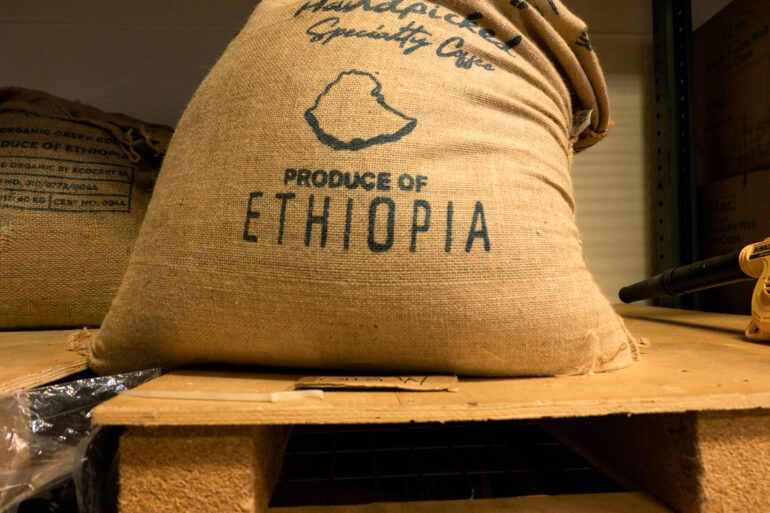
Coffee Roasting Startup Costs: Where to Spend the Money
Developing Business Savvy
Starting any business requires startup capital. Coffee roasting is no exception. The key to using that capital well is doing the research to understand how a business works before jumping in feet-first.
“None of us had business degrees. It was a lot of the Google MBA program,” Chris says, laughing. “The business plans, the finances. Beth is a champ. She taught herself QuickBooks, taught herself Photoshop, everything to do the stuff that I don’t do. We divided up the responsibilities and when we started, that’s what she did, all the accounting and marketing and HR and PR and all that stuff.”
Chris took care of client development and coffee sourcing, two areas he was already familiar with from his previous work. They had to teach themselves the rest from the ground up. To make the best decisions for their company, they worked hard to understand the financial component of running a small business.
Crunching the Numbers: Making the Right Financial Decisions
Chris openly admits that they’re very lucky because his father is a civil engineer in Napa. He helped connect them with reliable general contractors, plumbers, electricians, roofers, and other professionals in the early days. Using already-existing knowledge and connections can make or break many businesses.
The first major financial decision they made was where they would lease the facility they needed for their coffee roastery. It had to offer adequate space for a roaster and all the on-site storage they would require, as well as access to appropriate water and electricity supplies.
Ultimately, they chose a location outside of the main Napa center because it was more affordable than warehouses in town. They’re still close enough that deliveries aren’t an issue and it’s not inconvenient to drive there and back to pick up supplies for their popups or the new coffee shop.
“Being aware of your lease situation is huge,” Chris advises. “Knowing how to leverage and negotiate leases is super helpful for starting a business. Even getting the classic multiple bids for things. Don’t jump at your first option all the time.”
Purchase Your Own Roaster or Roast at a Co-Op?
After choosing a location, a coffee roasting company really needs one more thing to get started – the roaster itself. This is easily one of the largest financial decisions a new roastery can make.
Many small and craft roasters choose to roast at a co-op like Shared Roasting out of Brooklyn, New York or CoRo Coffee Roastery in Berkeley. This can mitigate most of the major cost of purchasing your own roaster while allowing access to high-performance equipment. It’s an excellent solution if there’s a shared roastery nearby.
Naysayer Coffee Roasters, on the other hand, knew from the beginning that they wanted to purchase their own roaster for their facility in Napa.
“For me, it was never a question. We were always going to buy our own,” Chris says. “I felt like it was a big step in taking responsibility and ownership of the business. Like, this is ours, we make it here in town, we’re a local company. We’re here for the town.”
Beth and Chris readily state that co-op roasting is a completely viable way to get into the coffee roasting business. For them, however, the nearest co-op would require a significant drive into Oakland or Berkeley, which went against their personal vision for their company. They wanted to be truly local, a fundamental piece of the Napa community. Reducing their carbon footprint was also an important part of their mission.
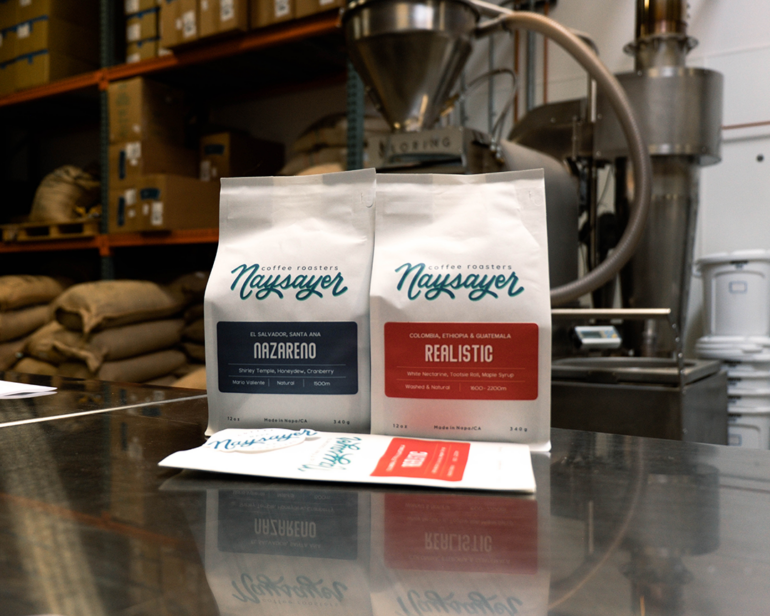
Choosing the Best Coffee Roaster for the Roastery
Selecting a commercial coffee roaster for a roastery startup should be at the top of the priority list for a new roasting company. Location and warehouse costs are large factors, but the roaster will impact the product and production itself.
During his time with Bodhi Leaf, Chris trained on a Diedrich IR-12 roaster, which is a fairly standard machine for routine coffee roasting. He learned all the customary coffee roasting theory as well as basic machine maintenance. When he and Beth looked at roasters for Naysayer, Chris felt set on a Diedrich because he was familiar with the machine. He also considered a Probat, which would be an additional expense but a worthy upgrade.
Then his father suggested he check out a local company in nearby Santa Rosa called Loring Smart Roast.
Immediately, Chris was struck by the level of control offered by a Loring roaster. The environmental impact and efficiency were additional factors that played directly into the mission and values laid out by Naysayer.
“We just loved them,” he says. “Especially in the roast where I can really manipulate and modulate the profiles, as Rob Hoos would say. That’s what I love, I love being able to do exactly what I want on a machine.”
They chose to take out a 7(a) SBA loan to purchase their Loring S15 Falcon. Chris says they have a couple years left on the loan and that it was worth it, even though it came with a learning curve. The Loring operated differently than the Diedrich he’d trained on, practically speaking. He had to relearn how to operate a new machine with different capabilities.
“It’s a fun thing to reimagine how you get to where you want to go,” he says. “It was very challenging and stressful at the beginning, especially when you’re trying to start a new business, but we grew and have grown to love it.”
Every commercial roaster offers its own benefits. Choosing the best roaster for a roastery startup comes down to the business’ goals and personal vision.
“Spend the money on the things that are important,” Chris advises. “Like a Loring or a bagger. It’ll save you time in the long run; it’ll make your product better in the long run.”
Thinking About Coffee Marketing and Branding
Every good business starts with a product or a service. Once that’s in the bag, the next major hurdle is informing customers about that product or service. Not only letting them know it exists in the first place, but also giving them a reason to try it.
Chris gives Beth serious props for taking the lead on their marketing efforts early in the game. She learned everything she could about social media, branding, marketing, graphic design, and whatever else she’d need to know to get the word out about Naysayer.
Speaking of Naysayer, it’s a unique name for a coffee brand. That’s very intentional.
“We get that question a lot,” Chris says. “People go, ‘Oh, Naysayer, that’s interesting.’ Partly from a branding perspective, that’s why we did it, because it’s catching and causes a question. It’s a single word, it’s a memorable word, and it creates that dialog.”
Deeper than that, the term “naysayer” goes to the core of their values as a company. Chris says the name has evolved in meaning for them throughout the course of the pandemic and has become a symbol of almost defiant optimism. It’s about being a naysayer against negativity.
“Not in a toxic ‘just ignore the bad stuff’ sort of way,” he says. “It’s more about creating hope and being a defender of that kind of stuff. Being able to do that with a cup of coffee. Here’s a coffee, it’s going to be okay today.”
Creating that level of personability in the brand was incredibly important to the husband-wife team. They wanted their business to be firmly local and a part of daily Napa life. They wanted to give back to the community that had given them so much.
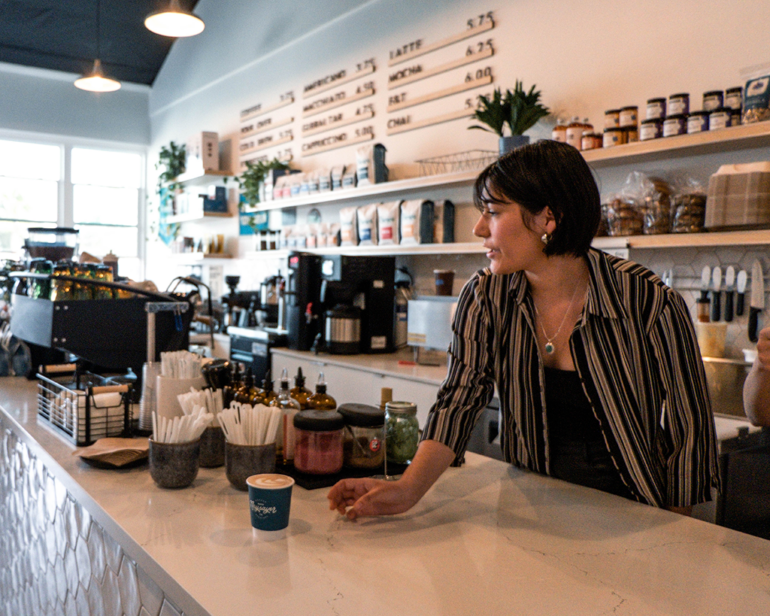
Counting on Your Coffee Community
Way back when Chris and Beth were considering where they’d start their coffee roasting business, Napa was the clear frontrunner. Although Napa Valley is best known as one of the wine capitals of the world, it seemed like there was room for a specialty coffee scene, as well.
“Chris is from here,” Beth says. “So honestly, starting something in Napa was the obvious place. It’s back home for him. And yes, I’d say there was a specialty coffee need that Napa didn’t necessarily know it wanted.”
Chris laughs. “The roaster they didn’t know they needed.”
Although there are other craft coffee roasters in the area, there weren’t many in Napa itself. Beth mentions Ritual Coffee Roasters, a Bay Area staple that Chris describes as a “super O.G. specialty roaster.” Ritual has a shop in the Oxbow Public Market in Napa, but their roastery and majority of operations remain in San Francisco.
“Some of our wholesale accounts have said we’re the first specialty roaster in Napa,” Chris says. “It feels like an honor.”
While coffee isn’t the first thing people think of when they think of Napa, it fits seamlessly into the culture of the town. After the wholesale business got off the ground, Naysayer expanded their offerings and partnered with several Michelin chefs in the area. They could bring local chefs into the roastery for a full cupping experience and talk to them about the terroir-driven aspects of coffee, speaking to their discerning palates as they decided whether to expand their coffee programs.
Chris says, “I’ve always been cautious of overusing the same language because coffee’s not wine, it’s coffee, and it’s not food, it’s coffee. But at the same time, it’s fun to be able to draw those parallels with people.”
Naysayer’s coffees can now be found in a variety of local venues, including Contimo Provisions in Napa, Bottega and Ottimo in Yountville, The Station and Acacia House in St. Helena, Sonoma’s Best and Kivelstadt Winery in Sonoma, Sam’s Social Club in Calistoga, Four Seasons Napa Valley, and Indian Springs Hotel & Casino.
Sharing their craft with the community goes beyond upscale restaurants where people pay upward of $100 per person for dinner, of course. Napa locals looking for their morning cup became equally as important as Naysayer expanded into the retail side of their business. These were the people who kept them going during the height of the pandemic.
“We have a banner in our coffee shop that’s like one of those old school camp banners and it says, ‘Greetings from Napa: Come for the wine, wake up for the coffee,’” Chris says. It’s a friendly nod to the community that got them where they are today.
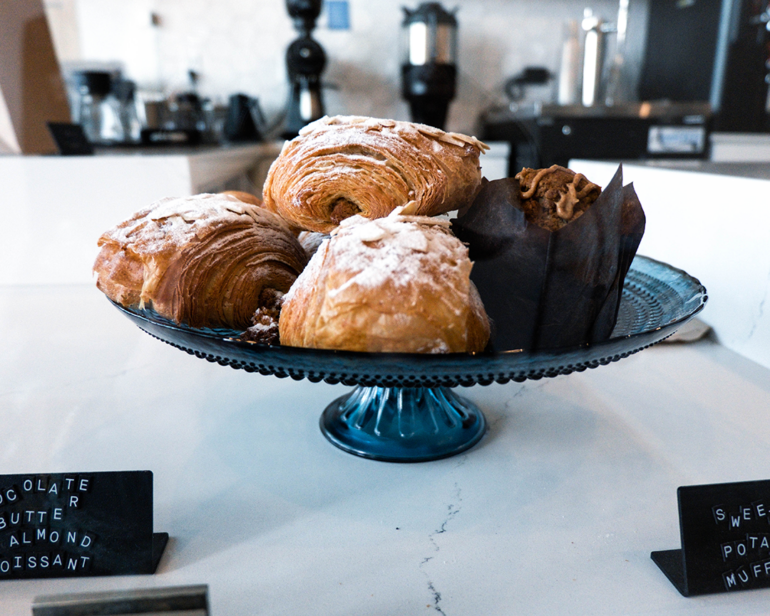
Choosing a Coffee Shop Location
The community itself was the ultimate driving force behind Naysayer choosing to open their flagship coffee shop in mid-2022, not even five years after launching their roastery.
Chris and Beth always knew a coffee shop was part of their plan. Initially, they wanted to grow the wholesale business for about five years before branching into retail. That plan was, obviously, upended early into their run. Their delivery business and popup location took off quickly with the locals and making the move to open a physical location seemed like the right course of action.
When a space in Napa’s Food City Center opened up and they were approached about the location, it felt like kismet. The center has been around for several generations and is located amidst several residential neighborhoods, which is exactly the vibe the Veceras wanted for their place.
Chris shares a memory. “Dave [our warehouse manager] was doing deliveries [to the shop] and somebody came in with just flip-flops and a sweatshirt in the morning, and he was walking back to his house with a coffee. That’s exactly what we wanted. I really like that.”
Choosing their coffee shop location was less about maximizing foot traffic and more about serving the community directly. They didn’t want to be one tiny location in a busy central hub, they wanted to be the cozy neighborhood coffee spot, and that’s exactly what they’ve become.
Businesswise, the move has been excellent for wholesale. They’ve been in the location for less than a year and Chris already sees it driving more wholesale thanks to having a space where they can host private espresso events for interested restaurant and winery staff.
Most importantly, in their opinion, the space gives them an opportunity to give back to their town. Their pastry case features a rotating selection of six or so Napa bakeries, including a few home bakers making cottage-style treats. Chris says he envisioned it as the pastry version of a taproom where they feature different local small businesses trying to get their foot in the door.
“We love that we get to bring those out,” Beth says.
“It’s another angle of the community-driven focus,” Chris agrees. “Support their dreams just like we had people supporting our dream when we were getting started.”
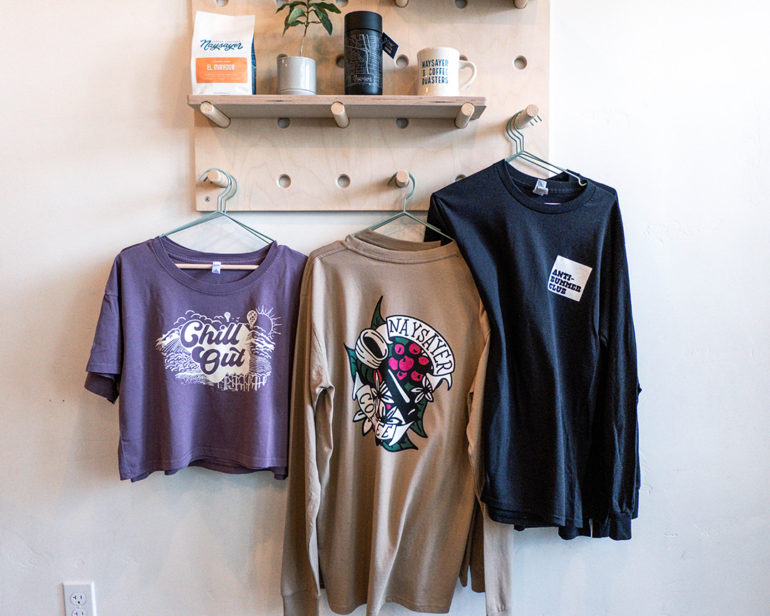
The Real Reason to Start a Coffee Roasting Company
There’s no single path to success when it comes to starting a coffee roasting business. There are a million ways to stumble and fall, but there are also a million ways to be successful. Naysayer was a brand-new business at the start of a global pandemic and through a combination of business savvy, community, and quick decision-making, they were able to pull through.
When asked to share an anecdote for those who are thinking about starting up their own roastery, Chris spoke about a friend from Bodhi Leaf, Jared, who started his own coffee importing company. Jared works with a women’s co-op out of Rwanda to source coffee, and once when he spoke with them, they said they were asked a similar question: if there’s one thing you want cafes in America to know about specialty coffee, what would it be?
Their answer: “It’s really hard to make coffee and I hope you like it.”
Chris and Beth love that sentiment and apply it to their own business. It’s simple and true – crafting coffee is a lot of fun, but it’s also very hard. The challenges of the industry can make it feel overwhelming. Nonetheless, you can’t escape the community nature of coffee.
“It really is hard, but it’s super rewarding and it’s so deeply rooted in community,” Chris says. “My favorite quote about coffee is that it’s the most global thing you do every day. Even the most direct trade coffee has twenty sets of hands […] that it goes through before it gets to your coffee cup. It’s super cool to be that one little link in the chain.”
They’ve always been determined to provide a quality cup of coffee in an accessible way. Chris jokes that they don’t want to coffee-splain to people. They only want their customers to try a cup Naysayer is excited about and then talk with them about it in as much or as little detail as they prefer.
Through the entire journey, including the ups and downs, Naysayer feels that it all comes back to that one line.
“I hope you like it.”